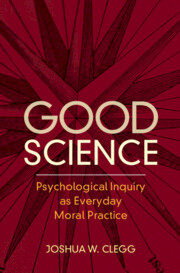Book contents
- Good Science
- Good Science
- Copyright page
- Dedication
- Contents
- Preface
- Acknowledgments
- Introduction
- Part I Clearing the Ground
- Part II Good Science
- 4 What Scientists Do
- 5 Justification
- 6 An Open Disciplinary Politics
- 7 A Committed Research Praxis
- Part III Charting the Moral Geography of Psychological Research
- Book part
- References
- Index
4 - What Scientists Do
from Part II - Good Science
Published online by Cambridge University Press: 06 January 2022
- Good Science
- Good Science
- Copyright page
- Dedication
- Contents
- Preface
- Acknowledgments
- Introduction
- Part I Clearing the Ground
- Part II Good Science
- 4 What Scientists Do
- 5 Justification
- 6 An Open Disciplinary Politics
- 7 A Committed Research Praxis
- Part III Charting the Moral Geography of Psychological Research
- Book part
- References
- Index
Summary
In Chapter 4, I draw on social science, historical, and philosophical studies of science to describe the everyday activities involved in science. I characterize the core scientific task as the production of accounts which legitimate, organize and mobilize scientific labor. These accounts are shaped by a complex network of social constraints and processes. Through the main body of the chapter, I describe some of these constraints and processes, including those cultural and political (e.g., national funding priorities), professional and disciplinary (e.g., disciplinary norms concerning methods, equipment, writing conventions, etc.), institutional (e.g., managing the requirements of bureaucracies and budgets), local and interpersonal (e.g., lab politics and professional rivalries), and dispositional and personal (e.g., personal talents and capacities for science work). I argue that these various social constraints and processes constitute the moral geography of science and that to navigate them well and responsibly is the substance of good science.
Information
- Type
- Chapter
- Information
- Good SciencePsychological Inquiry as Everyday Moral Practice, pp. 43 - 56Publisher: Cambridge University PressPrint publication year: 2022
